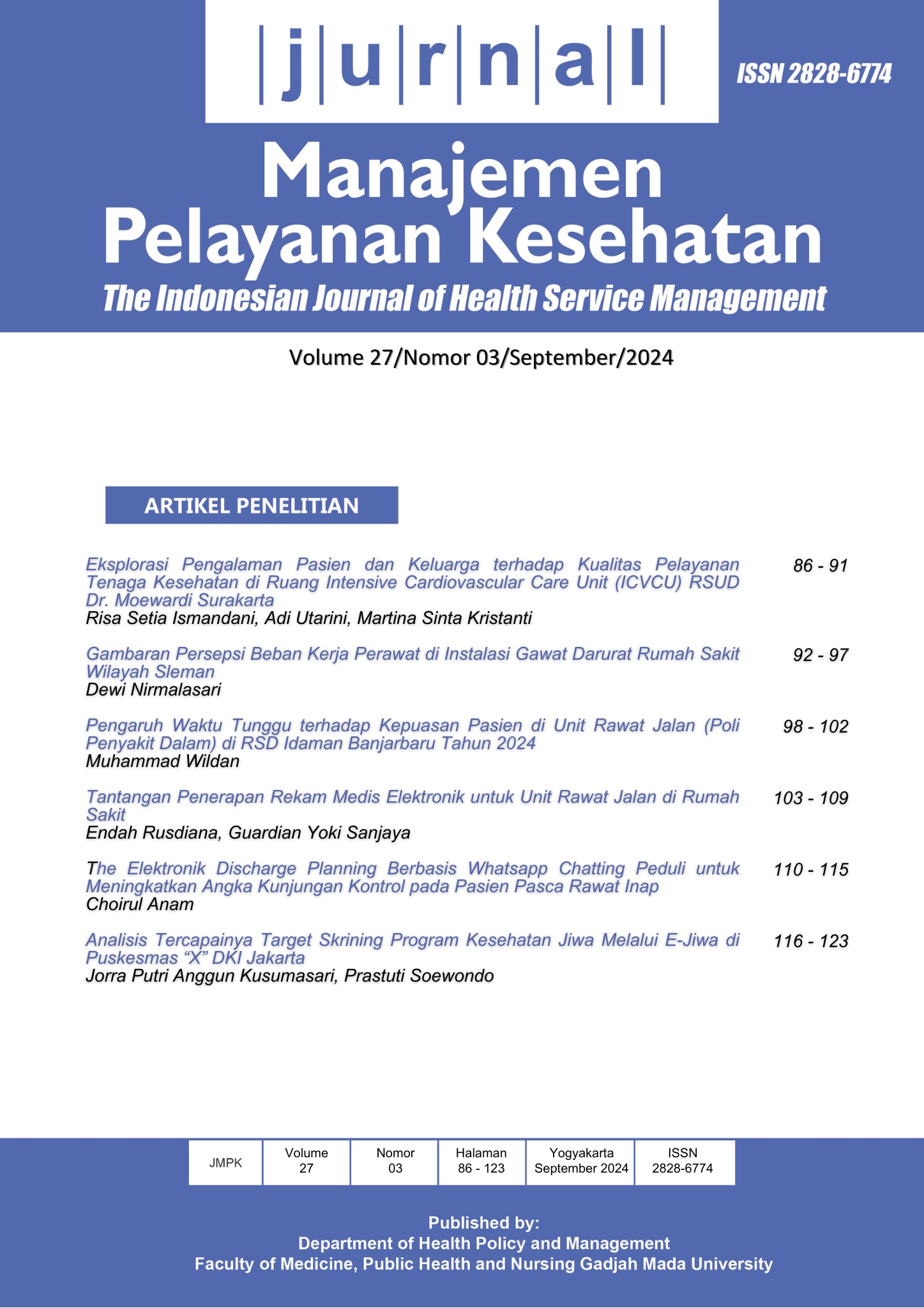GAMBARAN PERSEPSI BEBAN KERJA PERAWAT DI INSTALASI GAWAT DARURAT RUMAH SAKIT WILAYAH SLEMAN
The Perception of Nurse Workload at the Emergency Department of Hospitals in Sleman Region
Abstract
Background : Nurses in the Emergency Department (ED) have a higher workload compared to nurses in other units due to the increase in patient numbers, insufficient nursing staff, complex cases, time demands, and limited facilities. Therefore, regular workload assessments are crucial to optimize performance and healthcare service quality.
Objective : This study aimed to understand the perception of nurse workload in the ED of hospitals in the Sleman region.
Method : This research was a descriptive analytical study with a cross-sectional approach involving 122 nurses in the ED of Sleman Regional Hospital. The study measured nurses' workload perception using Nursalam's (2017) nurse workload questionnaire, covering job activities, types of tasks, and time usage. Univariate analysis was used to describe respondents' characteristics and nurses' workload perception in four EDs in the Sleman region, including RSUP Dr. Sardjito, RSA UGM, RSUD Sleman, and RS PKU Muhammadiyah Gamping.
Result : The research findings indicated that the average perception of nurse workload in the ED of Sleman Regional Hospital was 30,8 (SD±9,2), interpreted as a moderate workload. Job activities emerged as the highest domain with an average of 11,3 (SD±3,7) and the statement item with the highest average was direct nurse-patient contact in the ED at 2,7 (SD±1).
Conclusion : The overall perception of nurse workload in the ED of Sleman Regional Hospital indicated a moderate workload. The results of this research could serve as a basis for the hospital's ED in formulating policies related to nurse workload.
References
2. Potter P. Fundamental Of Nursing: Concept, Process and Practice. 2010;3.
3. Anggraeni D, Hakim L, Widjiati C. Evaluasi Pelaksanaan Sistem Identifikasi Pasien di Instalasi Rawat Inap Rumah Sakit. Jurnal Kedokteran Brawijaya. 2014;28(1):99-104. doi:https://doi.org/10.21776/ub.jkb.2014.028.01.32
4. Widayanti D. Hubungan Beban Kerja dengan Kinerja Perawat di Ruang Rawat Inap Kelas III RSUD Wates. STIKES Jenderal Achmad Yani Yogyakarta. Published online 2017.
5. Nursalam N. Metodologi Penelitian Ilmu Keperawatan: Pendekatan Praktis. Salemba Medika; 2017.
6. Kusuma INKA. Hubungan Beban Kerja dengan Kejadian Low Back Pain pada Perawat di Rumah Sakit Umum Wangaya Kota Denpasar. Published online 2022. https://itekes-bali.ac.id/. Accessed 2024.
7. Fitriyanti M. Burnout Ditinjau Dari Konflik Peran Ganda Dan Konsep Diri Pada Perawat Wanita Yang Sudah Menikah Di Rumah Sakit Dr Noesmir Baturaja. Published online 2022. http://repository.radenintan.ac.id/19511/1/PUSAT%20BAB%201%20DAN%202.pdf. Accessed 2024.
8. Hakim LN. Urgensi Revisi Undang-Undang tentang Kesejahteraan Lanjut Usia. Aspirasi: Jurnal Masalah-Masalah Sosial. 2020;11(1):43-55. https://doi.org/10.46807/aspirasi.v11i1.1589. Accessed 2024.
9. Enggune M, Runtu AR, Purba E, Tombuku S. Gambaran Persepsi Perawat tentang Beban Kerja selama Pandemi Covid-19 Di IGD RSU GMIM Bethesda Tomohon. PENA NURSING. Published online 2022:69-81. Accessed 2024.
10. Haryanti, Aini F, Purwaningsih P. Hubungan antara Beban Kerja dengan Stres Kerja Perawat di Instalasi Gawat Darurat RSUD Kabupaten Semarang. Jurnal Manajemen Keperawatan. 2013;1(1). Accessed 2024.
Copyright (c) 2025 Dewi Nirmalasari

This work is licensed under a Creative Commons Attribution-NonCommercial-ShareAlike 4.0 International License.




